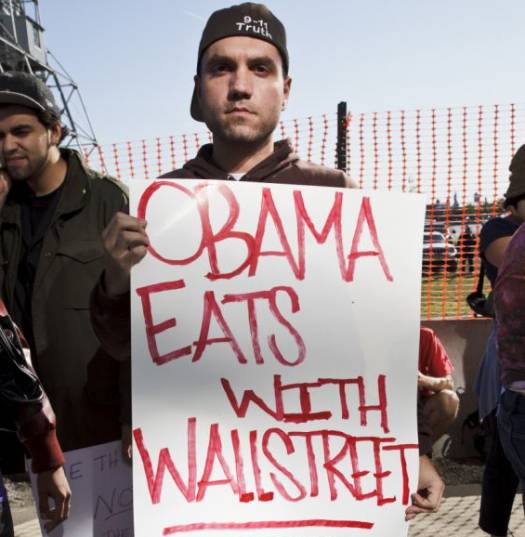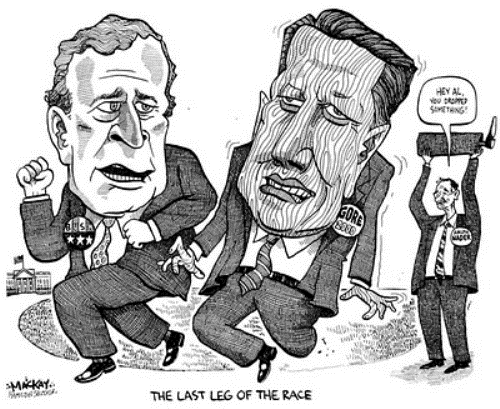The Counter-Intelligence Of Third Party Movements

As the American presidential election looms in the not-so distant future, political polarization has thrust formerly functioning parties into the depths of dysfunction and replaced them with vengeful factions that are fueled only by the other’s failure. It is not about fixing the economy anymore; it is about fixing the stage for the next election. While our economic fate may have already been sealed due to the political paralysis that has dominated the legislative scene, its exacerbation or amelioration hinges on the results of the 2012 Presidential election.
Heterogeneous and drawing from a panoply of activist groups, the Occupy Wall Street (OWS) movement has gained formidable power since its inception in mid-September. Despite Obama’s efforts to identify with OWS and mimic their fervor in his stump speeches, gravity has pulled the Obama Administration from campaign ambitions and dragged down Obama’s popularity in the polls. The fear, as John Nichols so aptly stated in a column in The Nation, is that the “movement might well develop into a virtual primary challenge for Obama.”

Because of Obama’s limited powers to enact the changes the OWSers so adamantly demand, bipartisan disenchantment and manifested outrage concerning current problems have largely distracted the left from how much worse things could be in the future. Thus, the stage is set for the emergence of appealing third party candidates at a juncture of extreme uncertainty. If history is to serve as any kind of guide, casting votes to emergent third parties leads only to the opposite of what political break-aways want.
1844 marked one of these pivotal Presidential elections. Largely divided on the issue of slavery, a sect of northern abolitionists did not seek to gradually abolish slavery; they demanded it then and there. With roots in the Second Great Awakening scene in New York, the Liberty Party canvassed the city and used then-modern media like the printing press to champion their cause throughout the state. Analogous to the Occupy Wall Street movement, Liberty Party members were often subject to violence throughout their work.

Despite being dubbed the “Great Compromiser” by many and an “ideal man” by future president Abraham Lincoln, the Liberty Party was disenchanted with Whig Henry Clay’s moderate stance on slavery. To them, he was not active or vehement enough in abolishing slavery in spite of the inconvenient reality that the executive branch at the time had little constitutional power to combat the issue directly. Thus the Liberty Party’s unrealistic goals of immediacy resulted in a significant vote for James Birney, which, as many speculate, cost Clay the state of New York and the election as a whole.
By voting directly against Henry Clay, the Liberty Party indirectly voted for a man whose ideals were the antitheses of their own. These individuals instead cast their ballots for James K. Polk, a pro-slavery expansionist who sought to annex Texas as a slave state even if it meant manipulating grounds for war, as was the case in the Mexican-American War. In his later years, Civil War hero and President Ulysses S. Grant called it “one of the most unjust wars ever waged by a stronger nation” and also “[followed] the bad example of European monarchies.” As a consequence, there was no immediate end to slavery, but rather a seemingly boundless extension to the West via his argument to extend the Missouri Compromise line to the Pacific Ocean and territory gained from the Mexican-American War. Polk’s policy of expansion at whatever the cost did not result in the mending of sectional schisms but the promulgation of policies that would eventually lead the nation to Civil War.

The 1844 Presidential Election resulted in a national hangover and tragic irony reminiscent of the 2000 Presidential election. Bored with the soporific speeches of candidate Al Gore and even more leery of George W. Bush’s specious Southern drawl, many voters found Green Party presidential hopeful Ralph Nader appealing. While Nader held tight to his party’s platform of nonviolence, social justice, and ecological wisdom, many were entranced by Ralph Nader’s rhetoric and goals concerning campaign finance reform, universal healthcare, and liveable wages that seemed unattainable within the two party system.
Despite receiving under 3% of the general election vote, Nader voters indirectly aided Bush’s ascension to the presidency. As a result, the tenants of their party as well as the focuses of Nader’s 2000 campaign were pushed that much further into the distance. During his presidency, the Bush administration refused to sign the global climate change combater, the Kyoto Protocol, under the auspices that it would “hurt the American economy.” Yet he continued trickle-down economic policies and championed the government deregulation that’s largely responsible for the derelict economy that many on the left complain about today.
Now as the American people stand at yet another precipice in our nation’s history, this pattern of good intentions followed by tragic outcomes may indeed manifest itself in the 2012 election. Much like the Liberty Party, OWSers have taken to the streets to demand immediate and drastic changes that cannot be realized solely through the executive branch. As such, many Americans’ support of the current political system has waned, and so too has support for both major parties. Libertarian OWSers advocate for the abolition of the Fed and the return to the gold standard, more liberal occupants champion increased regulation and wage increases, and then there is a good portion of protestors who are generally estranged from the American political and economic system.
The result is a movement that can impact the 2012 Presidential election in a few ways. The first and most effective use of its power is that its members can work to realize their idealistic goals by voting en masse for the Obama administration that is known for its pragmatic approach to progress and has recently made the effort to resonate with the protestors. The next option would be the opposite of the above: continued existence on the political fringe and exclusion from political processes, especially within the Democratic party. In effect, the OWSers would choose not to engage with a system viewed as corrupt and broken, and thereby abstain from participation. The third option, and perhaps the most fatal, would be the emergence of a third party candidate.
The Occupy Wall Street movement and groups across the world have recognized the succession of government failures and policies that resulted in the worldwide recession that we now face. They may now choose to unite and manifest their power directly by leveraging their influence onto the only administration that seeks to address the reasons behind as well as solve the disparities of wealth that have compelled so many to take to the streets. Conversely, they may be so outraged with the present state of America that they neglect to acknowledge the uncertainty of the future and more importantly, the predictive power of the past.
If Occupy Wall Street fails to do so, they will squander their efforts and indirectly allow the same broken system to continue — this time with the monopoly of the executive and legislative branches. We’ve seen civil war; we’ve seen ceaseless wars overseas; we now see global recession. If the movement does not unite for a realistic and common cause and for the administration that promotes it, what we will see in the future is much, much worse.
Savannah Cox is a Foreign Languages/International Studies and Political Science double major at Bellarmine University, and has recently returned from the University of Granada, where she studied Spanish and Political Science. She has interned for the World Affairs Council of Kentucky and Southern Indiana as well as Congressman John Yarmuth. In her free time, she enjoys reading, strumming a ukulele, and consuming large amounts of salty carbohydrates.









